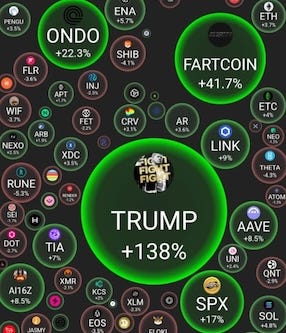The Rise of Meme Coins Threatens Real Innovation and the U.S. Economy
Crypto trading and casinos are fun but have real economic ramifications.
“Why would I invest in a startup and tie up my money when I can get 300% returns from meme coins?” — former startup investor, now crypto investor.
Many investors have asked this question in and now outside the ‘Web3 Community’ (early adopters to blockchain, crypto, NFTs, metaverse, etc.). I have been in meetings where investors explain how they made millions of dollars or hundreds of percentage gains within months, weeks, and even days. With fast, easy money stories like this, it’s no wonder people flock to these alternative investment vehicles. But no investor (or gambler) ever talks about their losses. Many people who got rich in initial coin offerings (ICOs) or non-fungible tokens (NFTs) also lost as much as 100% of their investments. But the next phase of this is the meme coin, a funny name coin designed to be a ‘symbolic gesture against traditional financial systems, embodying a rebellious or satirical stance towards fiat currencies’ (answer from Perplexity AI).

As the saying goes, ‘there is a sucker born every day,’ and that brings us to this week in the world of investments, where the newly inaugurated President of the United States launched his crypto token/coin called ‘Official Trump’ or $TRUMP that went from zero to $15B in less than 24 hours.
Diversion of Capital from Innovation to Speculation
Meme coins like $TRUMP, $MELANIA, $PEPE, and $FARTCOIN are fun and exciting, and if you are an insider, they can make you very rich. But if you are jumping in late, you will probably lose your money. We now live in a world where meme coins are worth more than corporations, but they don’t make any products, create any services or help advance humanity in any way, shape or form other than making those who created them rich(er).
This diversion of significant amounts of speculative capital that typically would be invested in startups, innovation, real estate and other producing assets means that instead of funding startups, R&D, or industries like clean energy, biotech, or AI, this capital is being funnelled into zero-value assets with no intrinsic or productive utility. This undermines the entrepreneurial ecosystem that drives real economic growth.
When you buy Microsoft shares, you own a part of the business and are entitled to a share of its profits. With bonds, you’re promised interest and repayment of the principal. When you’re buying crypto, what are you getting?

Crypto, however, operates differently. To avoid the Securities and Exchange Commission (SEC) classification as “illegal securities,” most tokens lack ownership rights or value accrual mechanisms. This has led many crypto projects to design tokens with poor “tokenomics,” making even some excellent protocols with real-world applications uninvestable.
The Upside of Meme Coins
Despite their reputation as “joke assets,” meme coins do offer some noteworthy benefits, such as:
- Increased Blockchain Usage
- Wider Cryptocurrency Adoption
- Innovation and Experimentation
The Dark Side of Meme Coins
However, these advantages come with significant drawbacks that threaten long-term progress and economic stability, such as:
- Rampant Scams and Fraud
- Pump and Dump Schemes
- Lack of Utility
- Market Distortion
In promoting the $TRUMP coin, the President told his supporters to “Have Fun!” The AP reported that the website selling the tokens said they are designed to be expressions of support, not investment opportunities, probably to avoid penalties from the SEC. While they have undeniably impacted the cryptocurrency ecosystem, their rise poses serious risks to innovation, economic stability, and even the integrity of the U.S. dollar.
Here are some risks meme coins have for genuine innovation and the US economy.
Erosion of Investor Confidence in Emerging Technologies
When meme coin bubbles inevitably burst (like the NFT market, which lost over 95% of its value), they leave behind a trail of financial ruin, causing investors to become risk-averse. This reduces the pool of available funding for legitimate, value-creating innovations, particularly in early-stage technology ventures where capital is needed for the next phase of innovation entrepreneurship in America.
The proliferation of meme coins also undermines confidence in the broader crypto ecosystem, which increasingly intersects with real-world finance. As the U.S. dollar remains the de facto global reserve currency, association with frivolous and speculative digital assets could tarnish its stability and trustworthiness, accelerating other nations' moves to seek alternatives. If the U.S. fails to regulate and maintain trust, it risks weakening the dollar’s dominance as the world’s reserve currency.
Meme coin culture promotes a gambling mindset, encouraging quick profits rather than long-term investment. This shift in investor psychology can trickle down to venture capital, public markets, and institutional investment, prioritizing fads over foundational advancements in science, technology, and industry.
Meme coins bring undeniable excitement, driving adoption, blockchain usage, and experimentation. But their speculative nature, fraudulent undertones, and lack of utility greatly overshadow their potential benefits. If the capital flowing into meme coins were redirected into meaningful innovations, America could maintain its leadership in global technological progress.
Whether you support meme coins or not, the casino is now open for business!!!

About
Alan Smithson, B.Sc., is a globally renowned futurist, keynote speaker, and
author dedicated to inspiring socially, economically, and environmentally responsible action. A father, founder, and DJ, Alan makes complex topics engaging and actionable, sharing insights in his TEDx talk ‘The Marriage of Education and Technology’.
Author of 2030: A Blueprint for Humanity’s Exponential Leap (out now!)

As co-founder of Emulator (touchscreen DJ technology), METAVRSE (3D creation platform), Unlimited Awesome (education for entrepreneurs), and Clean Data Centers (nuclear-powered data centers), Alan leads innovations in AI, blockchain, metaverse, education, and clean energy. He advises HSTAR Space and invests in Lawfully Minded (AI legal resource). He has also been a Techstars mentor, SXSW Pitch judge, and One Creativity Awards juror. Named a Top 50 Digital Futurist, Alan has spoken at CES, SXSW, TEDx, AWE, and featured in Forbes, VentureBeat, HBR, and CNN. As DJ “Lord Alan,” he’s performed globally and won DJ Mag’s Innovative Product award.
Learn more at AlanSmithson.com and 6ix.vc
